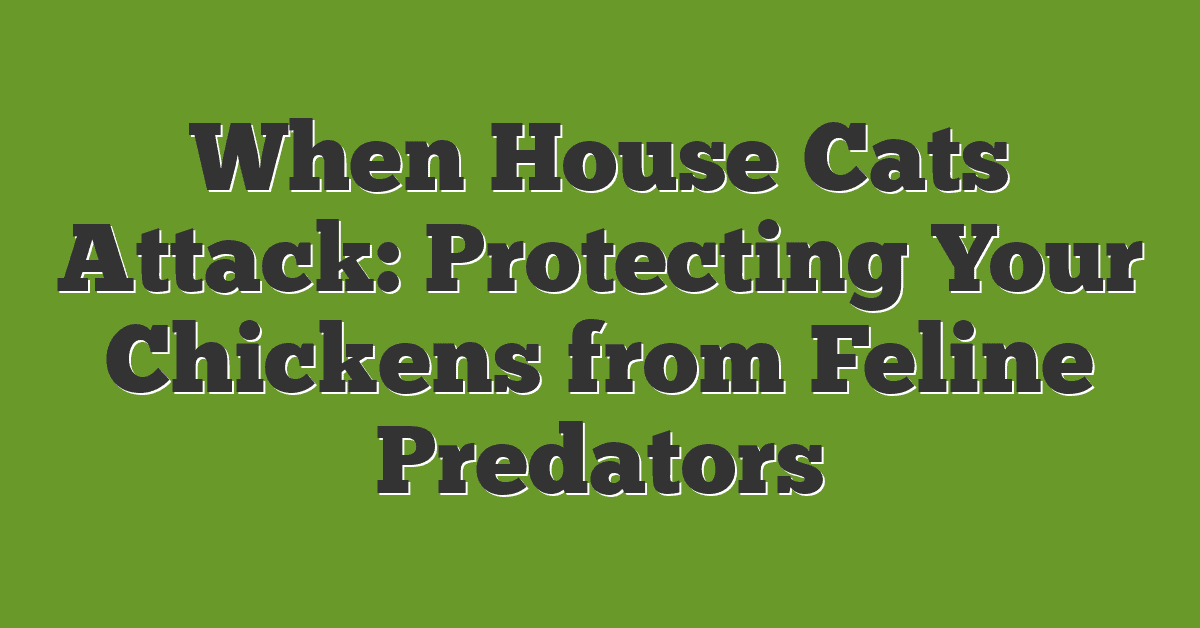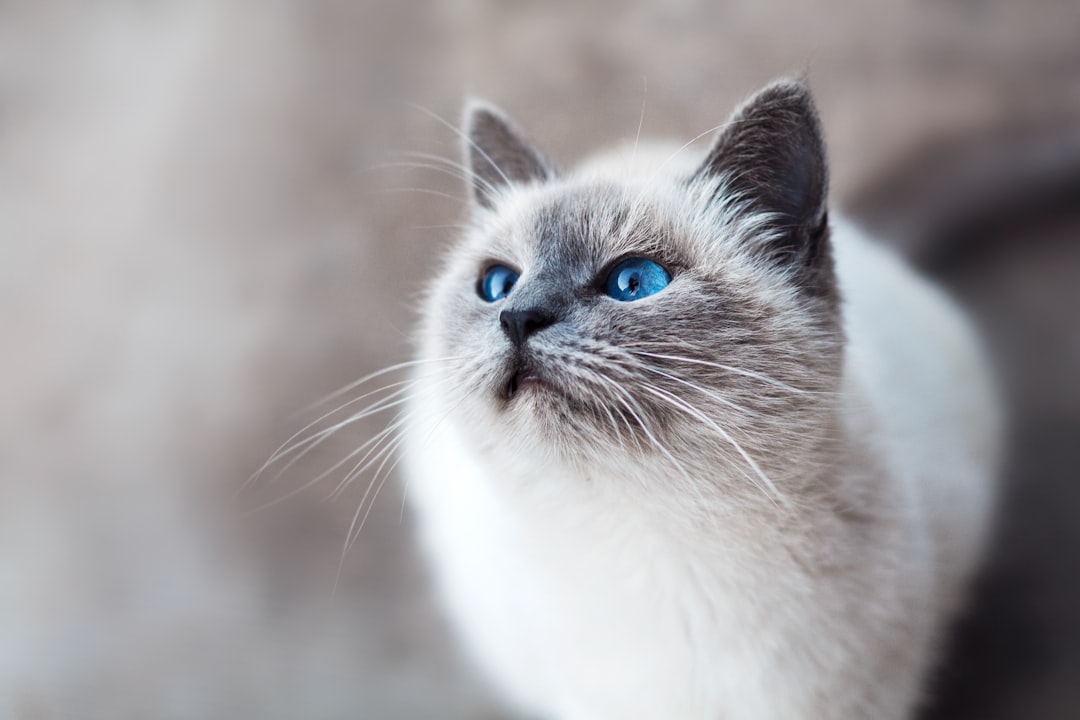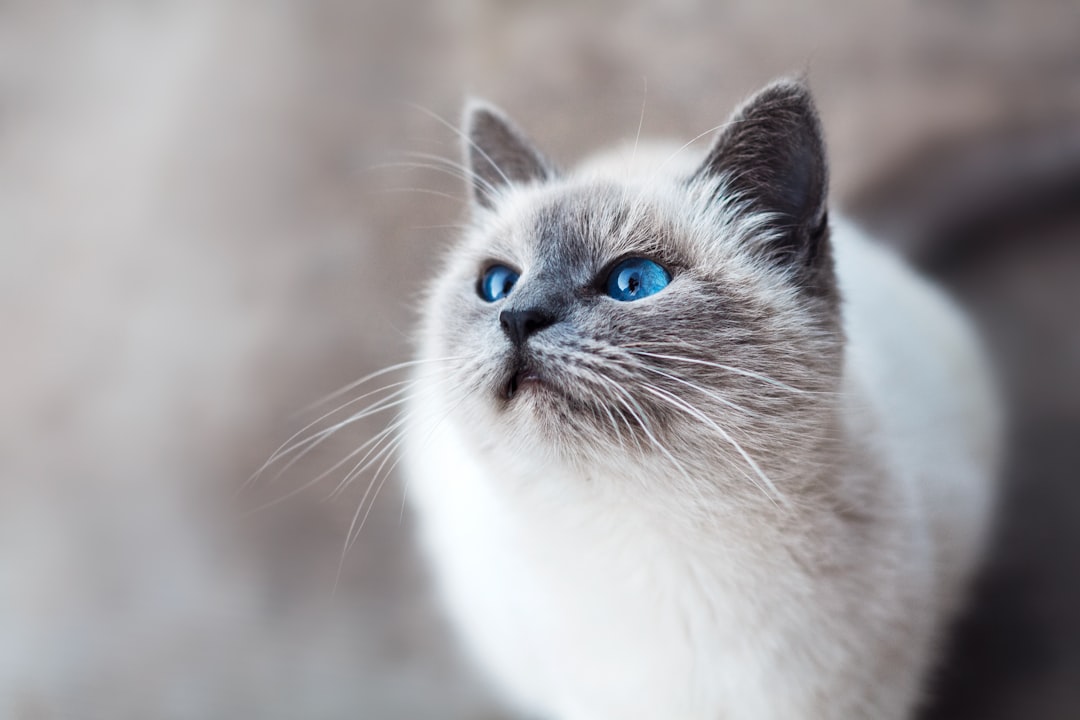If you’re raising chickens, you’re probably aware that predators pose a constant threat to your feathered friends. However, many backyard chicken owners do not realize that their beloved house cats can be a real danger to the birds. In this article, we’ll explore the intricacies of cat and chicken interactions, the threat house cats pose to chickens, and the measures you can take to safeguard your birds from feline predators. Read on to find out more.

Understanding Cat and Chicken Interactions
When it comes to backyard chicken keeping, cats are a common concern for many poultry owners. While domestic house cats are typically seen as harmless, they can pose a real threat to chickens. In this section, we will discuss how cats and chickens interact and what you can do to protect your birds.
The Threat of House Cats to Your Chickens
Cats are natural predators and have a strong hunting instinct. Even domestic house cats have been known to hunt and kill small animals such as birds, mice, and rabbits. This means that if your cat has access to your chicken coop or run, they may view your birds as prey. It’s also important to note that even if your cat doesn’t actively try to hunt your chickens, their presence alone can be stressful for your birds.
Managing Cat and Chicken Coexistence
If you’re a cat owner who also keeps chickens, it is possible for your pets to coexist peacefully. However, it’s important to properly manage their interactions. One way to do this is to give your cats access to a separate indoor space where they can retreat if they feel stressed or overwhelmed.
Cat-Proofing Your Chicken Coop
One of the most effective ways to protect your chickens from cat predators is to cat-proof your coop. This can be done by installing a wire mesh fence around your coop and run, making sure there are no holes or gaps for cats to slip through. Additionally, consider adding predator-proof locking mechanisms to all access points to ensure that cats can’t sneak in.
Minimizing Cat Disturbance in Your Chicken Run
If you allow your cats to roam in your yard, it’s important to minimize their presence in the chicken run. Consider installing a barrier around your run that is high enough to prevent cats from jumping over. You can also try sprinkling cayenne pepper or other natural cat repellents around the perimeter of your run to discourage cats from coming close.
Feral Cats in Poultry Farms
If you own a larger poultry farm, feral cats can pose a bigger threat to your birds. In this case, it may be necessary to take more drastic measures such as trapping and removing the cats or using a humane cat deterrent system to keep them at bay.
Conclusion: Ensuring Your Chickens’ Safety from Feline Predators
Understanding the potential threat that cats can pose to your chickens is the first step in ensuring their safety. By managing cat and chicken interactions, cat-proofing your coop, and minimizing cat disturbance in your run, you can keep your birds safe from harm. Remember, prevention is key when it comes to protecting your flock from predators.
The Threat of House Cats to Your Chickens
House cats are fluffy and cute, but they can also pose a threat to your backyard chickens. While cats are not natural predators of chickens, they can still cause harm by chasing, scaring or injuring them. Chickens are naturally fearful, and the sight of a cat can easily send them into a panicked frenzy. In addition, the mere presence of cats can disrupt the peaceful atmosphere of your chicken coop and cause stress on the birds.
It is important to remember that while your house cat may seem harmless, their instincts and predatory behavior can manifest in sudden and deadly attacks on your chickens. Some cats may even become territorial and aggressive towards the birds, making it necessary to take preventative measures.
Wild and feral cats, on the other hand, pose an even greater threat to your backyard flock. These cats are much larger and stronger than house cats and have natural predatory instincts, making them potentially lethal to your chickens.
To ensure the safety of your chickens, it is important to be aware of the threat that cats can pose. It is recommended that you keep cats away from your chicken coop and run by using barriers and deterrents that prevent them from getting too close. If you must allow cats to coexist with your chickens, it is imperative that you monitor their interactions closely to ensure no harm is done to your birds.
In the following sections, we will discuss how to manage cat and chicken coexistence and cat-proof your chicken coop to minimize the threat of feline predators.
Managing Cat and Chicken Coexistence
When it comes to raising backyard chickens, cat owners often wonder how their pets will interact with their feathered friends. While not all cats are natural predators to chickens, it’s important to take precautions to ensure your chickens’ safety.
Understanding Cat and Chicken Interactions
Before delving into cat-proofing your chicken coop, it’s important to understand how cats and chickens interact. Some cats have a high prey drive, while others may simply be curious and playful around chickens. It’s essential to observe your cat’s behavior around the chickens and monitor any interactions closely.
The Threat of House Cats to Your Chickens
House cats are known to hunt and kill small animals, including birds. If your cat is left unsupervised with access to your chicken coop or run, there’s a chance they may attack and kill your chickens. Additionally, even if your cat is not interested in hunting your chickens, their presence alone may stress out your birds and disrupt their natural behavior.
Managing Cat and Chicken Coexistence
Supervision: The first step in managing cat and chicken coexistence is to supervise any interactions between the two. Never leave your cat unsupervised with your chickens. Instead, introduce them under close supervision and monitor their behavior closely.
Provide Separate Living Quarters: Consider providing separate living quarters for your cats and chickens. This will help keep them physically separated and reduce the risk of any harmful interactions.
Training: If your cat has a high prey drive, it may be beneficial to train them to be non-aggressive around the chickens. This can be achieved through positive reinforcement training techniques or professional animal behavior training.
Cat-Proofing Your Chicken Coop
Secure the coop: Ensure that your chicken coop is securely enclosed and that there are no holes or gaps where cats can enter. Cat-proofing your coop can also help reduce the risk of other predators, such as raccoons or foxes, from accessing your chickens.
Install a cat-proof fence: If your cat has access to your chicken run, consider installing a cat-proof fence. This can be achieved by using materials such as mesh or netting that are too strong for cats to dig or climb through.
Minimizing Cat Disturbance in Your Chicken Run
Even if your cat is not necessarily a threat to your chickens, their presence alone can disrupt your birds’ natural behavior. To minimize cat disturbance in your chicken run, consider:
Providing hiding places: Chickens need a secure and safe space to retreat when they feel threatened. Providing hiding places such as bushes or small tunnels can help your chickens feel safe and reduce the potential for disturbance from a curious cat.
Providing distractions: Cats are naturally curious and playful, so providing distractions such as cat toys in a separate area of your backyard may help reduce their interest in your chickens.
Feral Cats in Poultry Farms
Feral cats can be a significant threat to your chicken flock, and it’s vital to take action if you notice a feral cat in your area. Consider contacting a local animal shelter or wildlife control agency to help manage the feral cat population in your area.
Conclusion: Ensuring Your Chickens’ Safety from Feline Predators
While cats and chickens can coexist, it’s important to take the necessary precautions to ensure your chickens’ safety from feline predators. By supervising interactions, providing separate living quarters, and cat-proofing your coop and run, you can help ensure the safety of your flock.
Cat-Proofing Your Chicken Coop
If you’re a poultry farmer or just keeping a few chickens in your backyard, it’s important to know that your feathered friends aren’t safe from the threat of feline predators. House cats are natural predators, and if given the opportunity, they may kill or harm your chickens. However, there are ways to deter cats from entering your chicken coop and protect your feathered friends.
One of the best ways to prevent cats from entering your chicken coop is to cat-proof your coop and run. Here are some tips to help you get started:
Cover the coop and run – One effective way to keep cats out of your chicken coop is to cover it entirely with a sturdy wire mesh. This will prevent cats from jumping in and preying on your chickens.
Secure entrances – Make sure that all the entrances to your coop and run are secure. Check for any holes, gaps or loose fittings and seal them. Ensure that all coop doors have secure latches that cats cannot open.
Create barriers – Creating physical barriers between the coop and run and the outside world can also be effective. Consider creating a mowed perimeter around the coop and run area or planting thorny bushes around the perimeter.
Sound repellents – In addition to physical barriers, sound repellents can also be effective. Consider installing motion-activated sensors that make loud noises when triggered to deter cats and other predators.
Scents – Cats are sensitive to smell, so consider using scents that cats find unpleasant. Sprinkling cayenne pepper, citrus peels, or coffee grounds around the coop and run can help deter cats from entering.
It’s also important to note that not all cats are feline predators. Many house cats coexist peacefully with chickens, and some even become friends! However, it’s difficult to predict which cats will go after your chickens and which will not. Therefore, it’s always best to err on the side of caution and take steps to protect your chickens from all potential threats.
By following these steps and cat-proofing your chicken coop, you can minimize the threat of feline predators to your feathered friends and ensure their safety. With proper precautions, your chickens can coexist peacefully with nearby cats and other predators.
Minimizing Cat Disturbance in Your Chicken Run
When it comes to keeping backyard chickens safe, preventing cat disturbance in their run is crucial. While outdoor cats may not actively hunt your chickens, their presence alone can stress the birds and wreak havoc on your chicken run. Thankfully, there are several steps you can take to minimize cat disturbance in your chicken run:
Secure the Run: The first step is to ensure the chicken run is fully enclosed and secure. Use sturdy materials like welded wire or hardware cloth to create a barrier that prevents cats from accessing the chickens. Also, make sure the run is covered to prevent any felines from jumping in.
Offer Hiding Spots: Provide hiding spots for your chickens to avoid any potential stress caused by observing the cats. Shrubs, bushes, and piles of leaves or branches will provide chickens with a place to retreat to when they see a cat enter the run.
Distract the Cats: Another way to minimize cat disturbance is by providing an alternative area for the cats to hang out away from the chicken run. Set up a designated area with food, water, and toys to attract cats away from the chicken run. This will also reduce the likelihood of them entering the chicken run.
Use Visual Deterrents: Scaring away cats using visual deterrents, such as shiny objects or decoys, is another method that may help minimize disturbance in the chicken run. Place reflective CDs or other shiny objects in the run or around its perimeter to dissuade cats from entering.
Make Noise: Lastly, cats are generally deterred by loud noises. Consider using motion-activated noise alarms or placing bells on the chicken run gate. This should scare the cats away and encourage them to stay away from the chickens.
By following these five simple steps, you can minimize cat disturbance in your chicken run and provide your flock with a safe and stress-free environment. However, if you still notice any signs of stress or distress in your chickens, it might be time to seek professional help and seek advice from an experienced livestock veterinarian or chicken expert.
Feral Cats in Poultry Farms
Feral cats can pose a significant threat to your poultry farm. These cats are wild and rarely interact with humans, making them difficult to control. They are opportunistic predators and will prey on your chickens, especially when there is a shortage of prey. To minimize the threat of feral cats to your poultry, you need to take appropriate steps.
One effective way of managing feral cats in poultry farms is through deterrence. You can use repellents or barriers to keep feral cats away from your poultry. Repellents will work by making your coop and run less attractive to cats. Some common repellents include mothballs, citrus peels, and ammonia. You can also use barriers such as fences to create an obstacle to feral cats.
Another way to keep feral cats away from your poultry is through trapping and removal. This strategy involves trapping feral cats and relocating them to other areas away from your farm. You can use live traps to trap the cats, but you need to be careful not to harm them. After trapping the cats, relocate them to a safe place far from your farm.
Finally, you can prevent feral cats from accessing your farm by minimizing food and water sources. Feral cats are attracted to food and water sources, so you need to keep them away from your farm. Ensure that your bins are closed and do not allow food scraps to accumulate in your farm. Clean your coop and run regularly to minimize the attraction of feral cats to your poultry.
In conclusion, feral cats are a significant threat to your poultry farm and can result in significant losses. By taking appropriate steps such as deterrence, trapping and removal, and minimizing food and water sources, you can keep feral cats away from your poultry.
Conclusion: Ensuring Your Chickens’ Safety from Feline Predators
To ensure your chickens’ safety from feline predators, it is important to understand the nature of cat and chicken interactions and take proactive measures to manage their coexistence.
By keeping your chicken coop and run cat-proofed, you can minimize any potential disturbances that may attract curious or mischievous cats. This includes securing any loose entry points, such as doors, windows, and ventilation tubes, and ensuring that all feed and water containers are inaccessible. Additionally, keeping your chickens securely confined in a predator-resistant chicken run during the day and locking them up in their coop at night can significantly reduce the chances of cat attacks.
For those who have feral cats or outdoor cats roaming around their property, managing their presence around your chickens is crucial. This can be done through a variety of approaches, such as humane trapping and relocation, contact with local animal control authorities, and the use of repellents and deterrents, including noise, motion, or scent-based products.
It is important to note that while cats may be natural predators, they are also domesticated pets that can live peacefully alongside chickens with proper management and socialization. By providing a safe and secure environment for your chickens and monitoring their interactions with cats, you can minimize the risks of feline predation and ensure their overall well-being.
In summary, cat and chicken coexistence can be managed with proactive measures such as cat-proofing your chicken coop, managing feral cats, and monitoring their interactions with chickens. By taking these steps, you can ensure the safety of your beloved backyard flock and enjoy the benefits of their fresh, delicious eggs.
[LIST]:
- Keep your chicken coop and run cat-proofed
- Secure any loose entry points
- Ensure all feed and water containers are inaccessible
- Keep your chickens securely confined in a predator-resistant chicken run during the day and lock them up in their coop at night
- Manage the presence of feral cats through humane trapping and relocation, contact with local animal control authorities, and the use of repellents and deterrents
- Monitor cat and chicken interactions
- Provide a safe and secure environment for your chickens
- Enjoy the benefits of fresh, delicious eggs from your beloved backyard flock!













